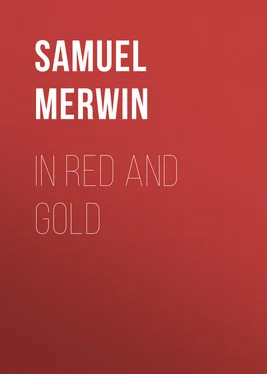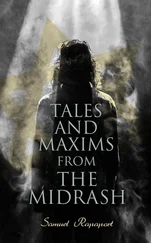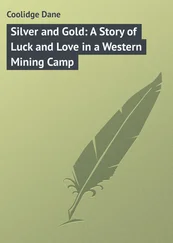Samuel Merwin - In Red and Gold
Здесь есть возможность читать онлайн «Samuel Merwin - In Red and Gold» — ознакомительный отрывок электронной книги совершенно бесплатно, а после прочтения отрывка купить полную версию. В некоторых случаях можно слушать аудио, скачать через торрент в формате fb2 и присутствует краткое содержание. Жанр: foreign_prose, на английском языке. Описание произведения, (предисловие) а так же отзывы посетителей доступны на портале библиотеки ЛибКат.
- Название:In Red and Gold
- Автор:
- Жанр:
- Год:неизвестен
- ISBN:нет данных
- Рейтинг книги:3 / 5. Голосов: 1
-
Избранное:Добавить в избранное
- Отзывы:
-
Ваша оценка:
- 60
- 1
- 2
- 3
- 4
- 5
In Red and Gold: краткое содержание, описание и аннотация
Предлагаем к чтению аннотацию, описание, краткое содержание или предисловие (зависит от того, что написал сам автор книги «In Red and Gold»). Если вы не нашли необходимую информацию о книге — напишите в комментариях, мы постараемся отыскать её.
In Red and Gold — читать онлайн ознакомительный отрывок
Ниже представлен текст книги, разбитый по страницам. Система сохранения места последней прочитанной страницы, позволяет с удобством читать онлайн бесплатно книгу «In Red and Gold», без необходимости каждый раз заново искать на чём Вы остановились. Поставьте закладку, и сможете в любой момент перейти на страницу, на которой закончили чтение.
Интервал:
Закладка:
“Why not?” The viceroy’s keen eyes dropped to the slightly faded blue uniform, then rested again on the strong face.
“The past few years – I will pass over the details – have been – well, not altogether happy for me. I have been puzzled. All the rich years of my younger manhood were given to the mission work. But I had to leave the church. At first I felt a joy in simple hard work – I am very strong – but hard work alone could not satisfy my thoughts.”
“No… No.”
“For a time I believed that the solution of my personal problem lay in taking the plunge into commercial life. I had come to feel, out there, that business was, after all, the natural expression of man’s active nature in our time.”
“Yes. Doubtless it is.”
“It was in that state of mind that I returned home – to the States. But it proved impossible. I am not a trader. It was too late. My character, such as it was and is, had been formed and hardened in another mold. I talked with old friends, but only to discover that we had between us no common tongue of the spirit. Perhaps if I had entered business early, as they did, I, too, would have found my early ideals being warped gradually around to the prevailing point of view.”
“The point stands out, though,” said the viceroy, “that you did not enter business. You chose a more difficult course, and one which leaves you, in ripe middle age, without the means to direct your life effectively and in comfort.”
“Yes,” mused Doane, though without bitterness. “I feel that, of course. And it is hard, very hard, to lose one’s country. Yet…”
His voice dropped. He sat, elbow on crossed knees, staring at the ever-changing river. When he spoke again, the bitter undertone was no longer in his voice. He was gentler, but puzzled; a man who has suffered a loss that he can not understand.
“All my traditions,” he said, “my memories of America, were of simple friendly communities, a land of earnest religion, of political freedom. In my thoughts as a younger man certain great figures stood out – Washington, Lincoln, Charles Sumner, Wendell Philips, Philips Brooks and – yes, Henry Ward Beecher. I had deeply felt Emerson, Longfellow, Lowell and Whittier. The Declaration of Independence could still fire my blood. And it was such a land of simple faith that I tried for so many years, however ineffectually, to represent here in China. To be sure, disquieting thoughts came – church disunity, the spectacle of unbridled license among so many of my fellow countrymen in the coast ports, the methods of certain of our great corporations in pushing their wares in among your people. But even when I found it necessary to leave the church, I still believed deeply in my country.”
He paused to control a slight unsteadiness of voice; then went on:
“May I ask if you, Your Excellency, after your long visits in Europe, have not come home to meet with something the same difficulty, to find yourself looking at your own people with the eyes of a stranger, receiving such an impression as only a stranger can receive?”
“Indeed, yes!” cried the viceroy softly, with deep feeling. “It is the most difficult moment, I have sometimes felt, in a man’s life. It is the summit of loneliness, for there is no man among his friends who can share his view, and there is none who would not misunderstand and censure him. And yet, a country, a people, like a city, does present to the alien eye, a complete impression, it exhibits clearly outlined characteristics that can be observed in no other way. Even the alien lose? that clear, true impression on very short acquaintance. He then becomes, like all the others, a part of the picture he has once seen.”
“It is so, Your Excellency. My country, in that first, startled, clear glance, affected me – I may as well use the word – unpleasantly. It was utterly different from anything I had known, a trader’s paradise, a place of unbelievable confusion, of an activity that bewildered, rushing to what end I could not understand.”
He was speaking now not only in the Chinese language but in the idiom as well, generalizing rhetorically as the Chinese do. It was almost as if the words came from a Chinese mind.
They were silent for a time Then the viceroy asked, in his gently abrupt way: “Why did you leave the church?”
“Because I sinned.”
“Against the church?”
“That, and my own faith.”
“Were you asked to leave?”
“No.”
“They knew of your sin?”
“I told them.”
“Yet they would have kept you?”
“Yes. My own feeling was that my superior temporized.”
“He knew your value.”
“I can not say as to that. But he wished me to marry again. I couldn’t do that – not in the spirit intended. Not as I felt.”
“We are different, Griggsby Doane, you and I. I am a Manchu, you an American. The customs of our two lands are very different. What would seem a sin to you, might not seem so to me. Yet I, too, have a conscience to which I must answer. I believe I understand you. It is, I see, because of your conscience that you sit before me now, on this boat and in this uniform, a man, as your great Edward Everett Hale has phrased it, without a country.”
He paused, and filled again the little pipe-bowl, studied it absently as his wrinkled fingers worked the tobacco. His nails were trimmed short, like those of a white man. Doane thought, swiftly, of the man’s dramatic past, sent out as he had been to become a citizen of the world by a nation that would in very necessity fail to understand the resulting changes in his outlook. There was his daughter; she would be almost an American, after four years of college life. And she, now, would be a problem indeed! What could he hope to make of her life in this Asia where woman, like labor in his own country, was a commodity. It would be absorbingly interesting, were it possible, to peep into that smooth-running old brain and glimpse the problems there. They were gossiping about him. His stately figure was to-day the center about which coiled the life and death intrigue of Chinese officialdom and over which hung suspended the silken power of an Oriental throne… Doane’s personal problem shrank into nothing – a flitting memory of a little outbreak of egotism – as he studied the old face on which the revealing hand of Age had inscribed wisdom, kindliness and shrewdness.
Soft footfalls sounded; then, after a moment, a sharper sound that Doane assumed, with a slight quickening of the imagination, to be the high wooden clogs of a Manchu lady, until he realized that no clogs could move so lightly; no, these were little Western shoes.
A young woman appeared, slender and comely, dressed in a tailored suit that could have come only front New York, and smiling with shy eagerness. She was of good height (like the Manchus of the old stock), the face nearly oval, quite unpainted and softly pretty, with a broad forehead that curved prettily back under the parted hair, arched eyebrows, eyes more nearly straight than slanting (that opened a thought less widely than those of Western people), and with a quaint, wholly charming friendliness in her smile.
He felt her sense of freedom; and knew as she tried to take his huge hand in her own small one that she carried her Western ways, as her own people would phrase it, with a proud heart. She was of those aliens who would be happily American, eager to show her kinship with the great land of fine free traditions.
And holding the small hand, looking down at her, Doane found his perhaps overstrained nerves responding warmly to her fine youth and health. He reflected, in that swift way of his wide-ranging mind, on the amazing change in Chinese official life that made it even remotely possible for the viceroy to present his daughter with a heart as proud as hers. The change had come about during the term of Doane’s own residence… America, then, was not alone in changing. It was a shaking, puzzled and puzzling world.
Читать дальшеИнтервал:
Закладка:
Похожие книги на «In Red and Gold»
Представляем Вашему вниманию похожие книги на «In Red and Gold» списком для выбора. Мы отобрали схожую по названию и смыслу литературу в надежде предоставить читателям больше вариантов отыскать новые, интересные, ещё непрочитанные произведения.
Обсуждение, отзывы о книге «In Red and Gold» и просто собственные мнения читателей. Оставьте ваши комментарии, напишите, что Вы думаете о произведении, его смысле или главных героях. Укажите что конкретно понравилось, а что нет, и почему Вы так считаете.












